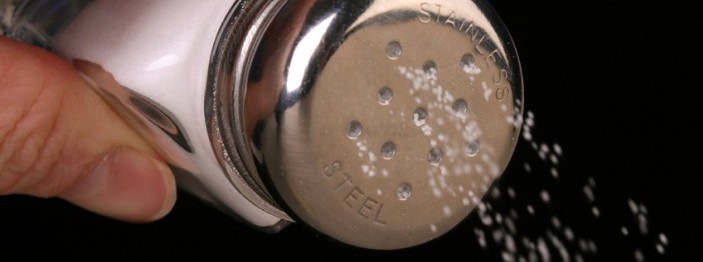Salt revisited
1stCongress of the European Academy of Neurology, Berlin, Germany, June 20-23, 2015 – People with MS are often advised to follow a low-sodium diet because salt may worsen their symptoms. That recommendation originates from a laboratory study that found that higher concentrations of salt promoted more aggressive inflammatory cells (called Th17), which worsened the animal equivalent of MS (Kleinewietfeld et al. Nature 2013;496:518-522). That led to a small study in people with MS, which found that those with a high-salt diet (estimated by the amount of salt in urine) had four times more relapses compared to people with a low-salt diet (Farez and colleagues. J Neurol Neurosurg Psychiatry 2015;86:26-31). These results were first reported two years ago (see Salt, sex and exercise at ECTRIMS – Day 2, MSology, Oct. 10, 2013).
Two new studies have looked at the issue of salt and MS and have come up with a slightly different story. Salt consumption was estimated (with urine again) in a group of people enrolled in a Tysabri study (Pignolet et al. EAN 2015; abstract P4214). However, there was no association between salt consumption and the severity of MS.
Another study published earlier this year may provide an explanation. Animals fed a high-salt diet didn’t have evidence of a more aggressive immune profile (Krementsov et al. FASEB J 2015; epublished April 27, 2015). But salt did affect the leakiness of the blood-brain barrier (BBB), the tightly-packed cells that are meant to block damaging substances (including immune cells) from entering the central nervous system (CNS).
The BBB is already more permeable in people with MS, so salt may worsen the problem of activated immune cells entering the brain and spinal cord. In fact, this is how Tysabri works: it blocks activated cells from getting into the CNS. So the effects that salt has on the BBB may be less important in people taking Tysabri. The interferons used to treat MS (Avonex, Betaseron/Extavia, Rebif) also act on the BBB (among other things) (Kieseier BC. CNS Drugs 2011;25:491-502). So it may be that people taking one of the interferons might also be less affected by a high-salt diet.
This isn’t to say that people taking Tysabri or an interferon can merrily increase their salt quota. Salt restriction has other health benefits, although these appears to be largely confined to people with high blood pressure or kidney disease (Adler and colleagues. Cochrane Database Syst Rev 2014 Dec 18;12:CD009217; Graudal and colleagues. Adv Nutr 2015;6:169-177; McMahon and colleagues. Cochrane Database Syst Rev 2015 Feb 18;2:CD010070). But it’s prudent to avoid the salt shaker, check out the sodium content on packaged foods and choose low-sodium alternatives whenever possible.
Share this article
Facebook Twitter pin it! Email
Related Posts
Back





